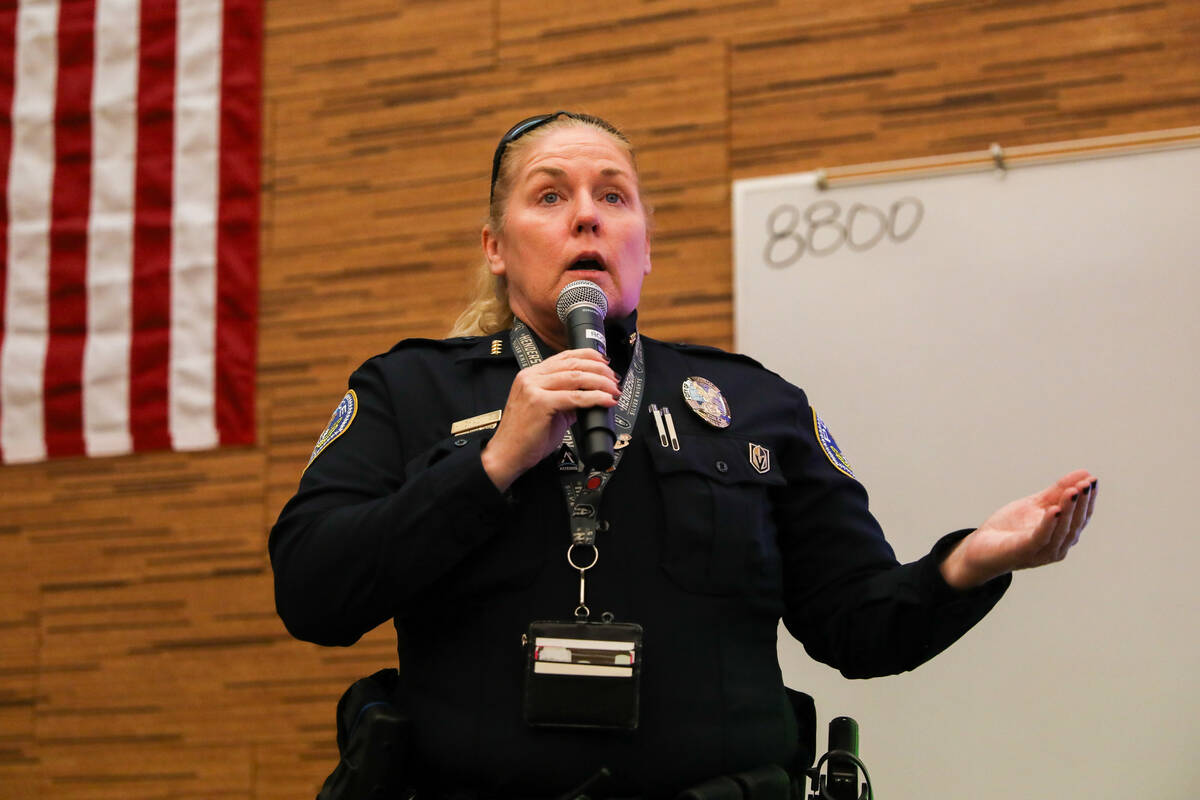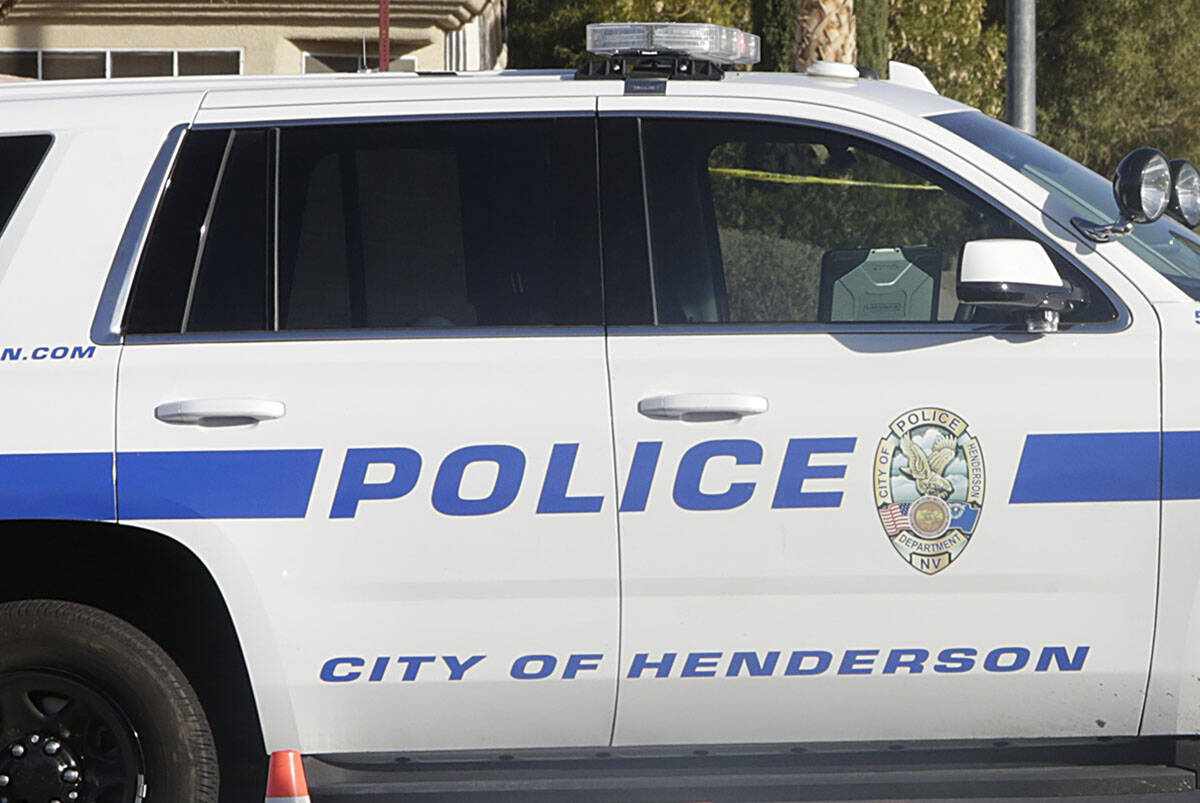What are they hiding?: HPD says it will ‘vet’ reporters
Henderson police public information officers are paid by taxpayers to release important information about the agency’s work, but records show they are also focused on spinning the coverage and vetting reporters for their attitude toward the agency.
In August, Henderson police Sgt. Daniel Medrano promised officers that his team would “vet each news reporter” to “make sure your interview is a positive one and makes your unit and the department look good,” according to an email obtained by the Las Vegas Review-Journal.
Medrano is in the department’s public information office, which Henderson and government agencies around the U.S. set up to field inquiries from the public and media. But the taxpayer-funded positions also can be used as gatekeepers to prevent access to information and officials, critics say.
About half of police communications officials surveyed by the Society of Professional Journalists in 2016 admitted to snubbing journalists they don’t like.
That statistic and the Henderson police email should raise alarms when it comes to transparency and accountability, experts say.
“That is darn right scary – the government vetting journalists to see which ones will provide positive coverage and which ones to blackball,” said David Cuillier, director of the Brechner Freedom of Information Project at the University of Florida. “People should be concerned because in a democracy we demand to know what our government is up to – good and bad – and not spoon-fed only positive news.”
Medrano, who made more than $227,000 in pay and benefits last year, did not return phone calls for this story. A public information department email, which did not have the sender’s name, said Medrano was “out of the office for an unspecified amount of time” and would respond when he returned.
Taxpayers also paid more than $453,000 in wages and benefits last year for the department’s two other public information officers, Katrina Farrell and Alan Olvera.
Records denied
When releasing public records, the city of Henderson is also arbitrarily redacting records, including one the city previously provided without deletions. City officials recently redacted the name of an officer who sent an email, citing privacy concerns. But the city released that same email — with the officer’s name on it — months ago as part of another records request.
The city also redacted other emails under attorney-client privilege and completely withheld 29 others for “deliberative process.” The Nevada Supreme Court has repeatedly ruled that governments are required to provide an explanation of what is privileged when they claim an attorney-client exemption to withhold records.
“They simply referenced those privileges, which only apply to a narrow class of records, and, in a sense said, ‘trust us.’ That’s not how the Nevada Public Records Act is supposed to work,” said Benjamin Lipman, the Review-Journal’s chief legal officer. “And of course, there’s no defense to hiding information that is already public.”
City officials did not return requests to explain the redactions and did not provide a comment for this story.
For a story on excessive overtime and mistakes made at the city’s jail, the newspaper made repeated attempts to reach officers and police Chief Hollie Chadwick for comment. No city officials agreed to an interview.
Henderson City Council members, who are elected to be responsive to taxpayers’ concerns, also did not return the Review-Journal’s requests for comment on the jail overtime story. The newspaper attempted to interview them after an Aug. 15 City Council meeting, but they all fled.
A reporter was told that the elected officials were in a meeting and could not be interviewed. The Review-Journal then requested their calendars, which showed that only Councilwoman Carrie Cox had an appointment scheduled at the time.
Mayor Michelle Romero, who was not present at the meeting, put out a statement through a public information officer instead of sitting for an interview. Council members Cox, Dan Shaw, Dan Stewart and Jim Seebock only spoke to a reporter when she showed up to public “Morning Meet Ups” the elected officials hold to speak to constituents.
Henderson residents pay the mayor about $70,000 a year, and each City Council member makes nearly $57,000.
Lawsuit to change report
After the Review-Journal published the story, a police union and the city sued the newspaper over a video posted with the investigation.
The lawsuit claims the Review-Journal broke a state law that says images of officers in the possession of a law enforcement agency are confidential. Lipman said the statute only forbids police agencies from releasing the photos, not media outlets from publishing them.
The law, enacted in 2005 and heavily supported by the unions, was meant to protect officers, union officials testified, but the city and union could not provide any examples of danger to officers because of the video.
Transparency experts contend that the law also shields officers from outside scrutiny.
“It really undermines accountability when there’s any kind of secrecy around policing operations,” said Lauren Bonds, executive director of the National Police Accountability Project. “Transparency is a precursor and an indispensable first step for meaningful reform and meaningful accountability.”
The “What Are They Hiding?” column was created to educate Nevadans about transparency laws, inform readers about Review-Journal coverage being stymied by bureaucracies and shame public officials into being open with the hardworking people who pay all of government’s bills. Were you wrongly denied access to public records? Share your story with us at whataretheyhiding@reviewjournal.com.
Contact Briana Erickson at berickson@reviewjournal.com or 702-387-5244. Follow @ByBrianaE on X.



















